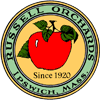
Russell Orchards
143 Argilla Rd.
Ipswich, MA
978-356-5366
@russellorchards
143 Argilla Rd.
Ipswich, MA
978-356-5366
@russellorchards
Crops
Growing Practices
All of our fruit is grown using IPM (Integrated Pest Management) methods. This means we use only a very limited amount of elemental (naturally ocurring) or
synthetic (made in laboratory setting) inputs to specifically combat the most egregious of pests. IPM is a very scientific approach designed to predict and prevent pests and
disease from causing crop damage or failure. Fruits are carefully monitored throughout their growth stages for signs of disease, infection, or pest
damage. Problems and pests are identified and targeted with specific inputs such as pesticide or fungicide, calculated very meticulously to ensure
proper application and safety. A licensed pesticide applicator must keep detailed records of any and all applications throughout the season, and
these records are routinely checked and verified by the EPA.
Although we are not certified USDA Organic, many of our fruits and vegetables are grown using true organic practices and some of our pest management systems mirror many that can be found in the organic register. However, even organic sprays can be poisonous, which is why we close off the orchards to the public when an application is occurring or has just occurred. There is always a safe interval of time before workers or the public are allowed to enter into an area that has been sprayed. A harvest will only occur after the prescribed time has elapsed and there is no danger of pesticide exposure. See our FAQ page for more information.
In some cases, no sprays whatsoever have been applied to the crop. Our vegetables and herbs are completely all-natural, receiving only the occasional spritz of organic insecticidal soap. We take our stewardship of the land and your trust in our agricultural ethics very seriously. Our commitment to growing all-natural, excellent vegetables and healthy fruit for you is stronger than ever. We believe deeply that producing local food grown sustainably and ethically is one of the ways that we can contribute to a healthy and happy society!
Although we are not certified USDA Organic, many of our fruits and vegetables are grown using true organic practices and some of our pest management systems mirror many that can be found in the organic register. However, even organic sprays can be poisonous, which is why we close off the orchards to the public when an application is occurring or has just occurred. There is always a safe interval of time before workers or the public are allowed to enter into an area that has been sprayed. A harvest will only occur after the prescribed time has elapsed and there is no danger of pesticide exposure. See our FAQ page for more information.
In some cases, no sprays whatsoever have been applied to the crop. Our vegetables and herbs are completely all-natural, receiving only the occasional spritz of organic insecticidal soap. We take our stewardship of the land and your trust in our agricultural ethics very seriously. Our commitment to growing all-natural, excellent vegetables and healthy fruit for you is stronger than ever. We believe deeply that producing local food grown sustainably and ethically is one of the ways that we can contribute to a healthy and happy society!